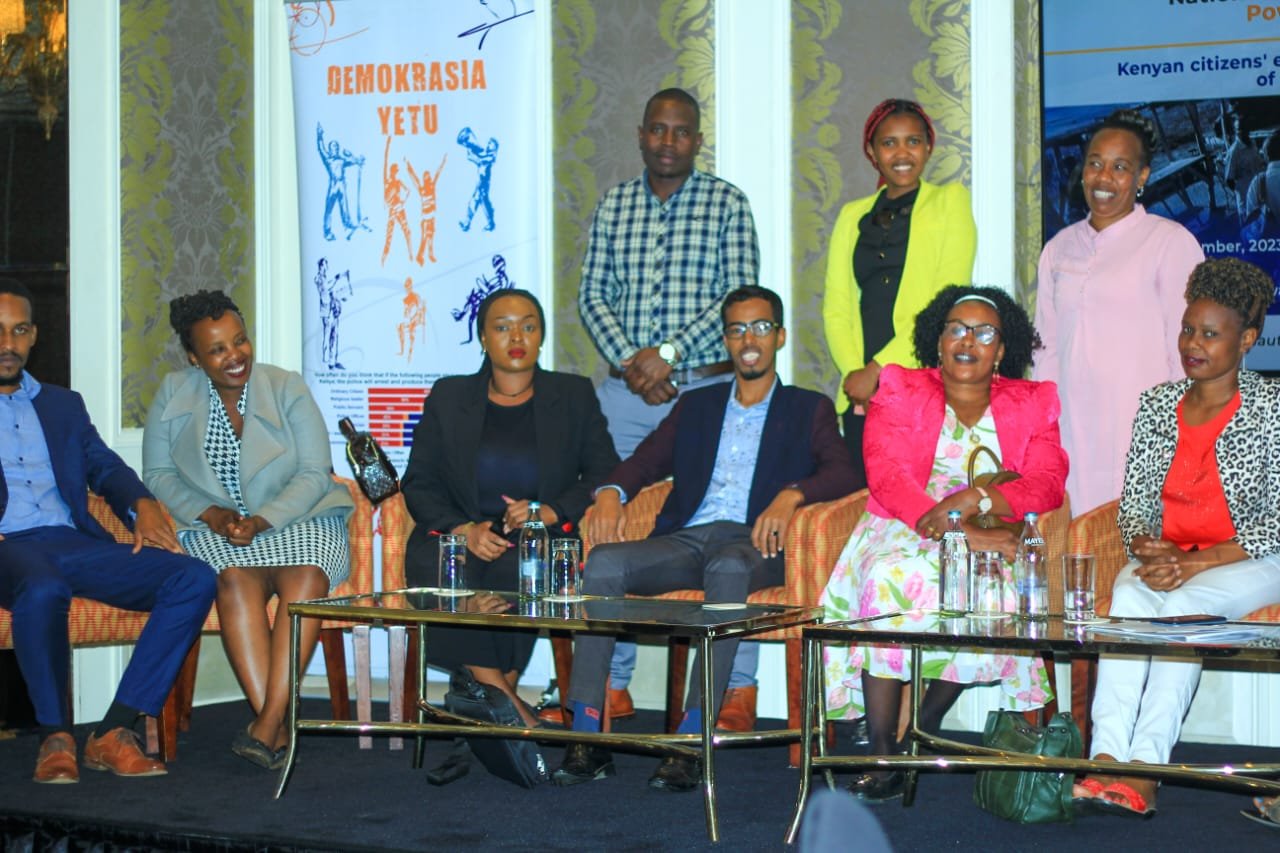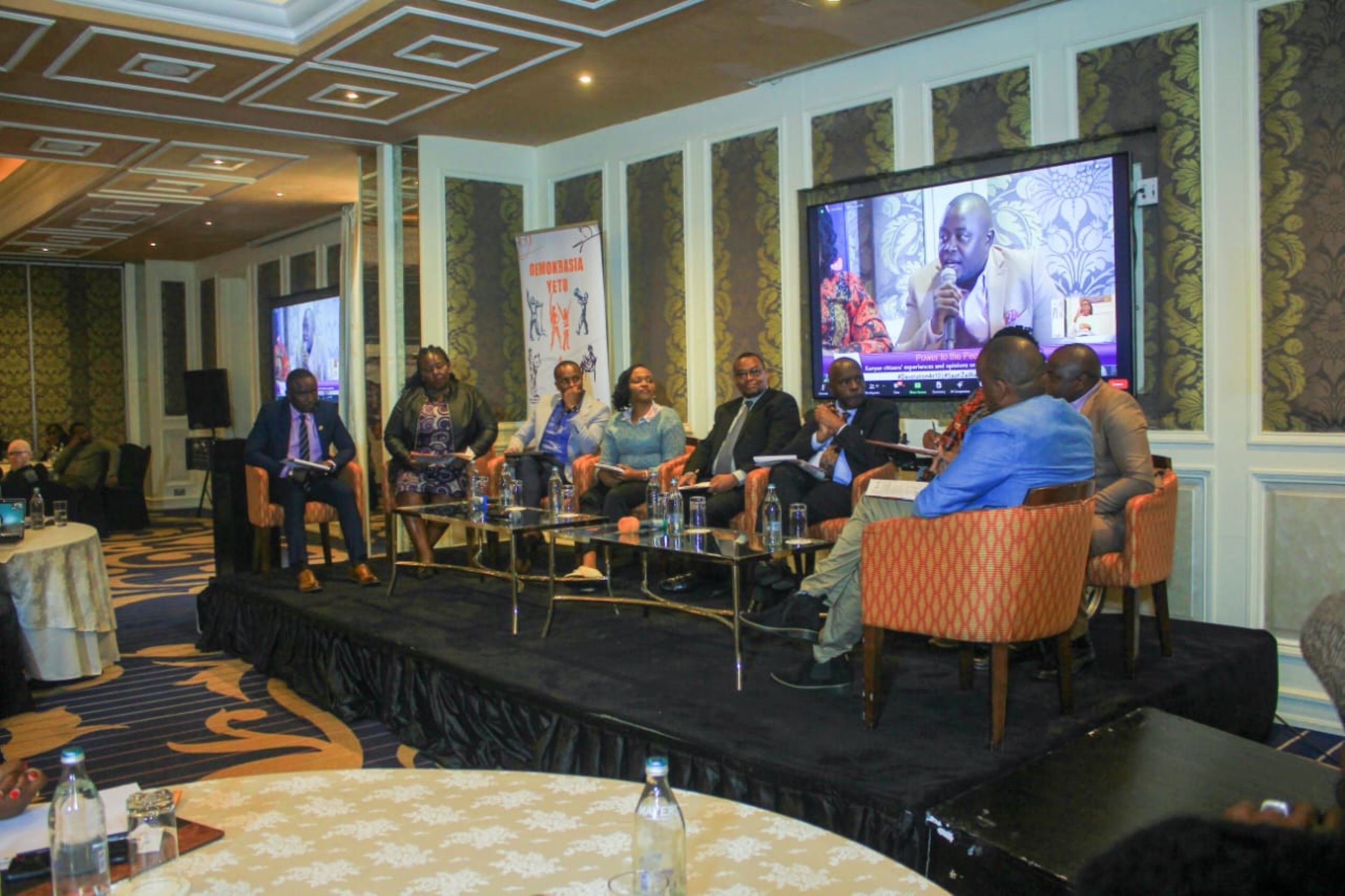Twaweza East Africa is a regional non-governmental organization (NGO) that works to amplify citizens’ voices and infuse them in policy-making by sharing them with the duty bearers at national and county levels. The research report is from data collected in July 2023 from a nationally representative sample of 3,746 respondents. This report provides citizen-generated and citizen-focused insights assessing the extent of the impact of devolution. It sheds light on the following:
Citizens understand the term “devolution” and whether or not they feel devolution is working. The areas where devolution has had the most and the least impact include the biggest challenge of devolution.
Citizens’ level of participation in the devolution process and whether this has improved over the years.
Kenyas’ view on the allocation of funds to the counties.
The Youth Cafe participated in the event held on 27th November 2023 at Villa Rosa Kempinski from 0900hrs to 1400hrs. The main items discussed in the meeting were citizens’ opinions on devolution practice, citizens’ support for devolution in Kenya, Citizen’s concerns about devolution, how government functions should be allocated between county and national government, budget allocation and its impact on society and public participation.
The insightful discussion was enriched by the following panelists:
Prof Kivutha Kibwana - Former Governor, Makueni County
Mr Samuel Kimeu - Executive Director, Africa's Voices Foundation
Ms Diana Misango - National Coordinator, Institute for Social Accountability (TISA)
Mr Edwin Adoga - Country Program Coordinator, Konrad Adenauer Stiftung
Ms Sheila Masinde - Executive Director, Transparency International Kenya (TI-Kenya)
Mr. Gitonga Kinyanjui - National Chairperson, Council of Ward Administrators
Mr. Michael Mburu - Acting CEO, Kiambu Pamoja Trust; Convener of Public Participation & Civic Education Committee, Kenya Devolution CSOs Working Group
Dr Rebecca Betalanyi - Deputy Director, State Department for Devolution
The report was officially launched on November 27, 2023. Some of the key findings from the report include:
Most citizens have some understanding of devolution in Kenya, and most say devolution is being implemented well.
Support for devolution in Kenya is strong. 3 out of 4 citizens say devolution has led to better services
Citizens’ biggest concern around devolution is corruption.
Citizens are divided on how government functions should be allocated between the county and national governments.
2 out of 3 citizens say devolution has helped improve health services in their county
Citizens are more likely to say the budget allocated to counties is insufficient than sufficient.
Citizens are largely unhappy with their revenue collection.
Overall, many citizens are uncertain about the impact of devolution in Kenya.
Participation is understood primarily as taking part in public meetings.
Citizens report increasing participation in county decision-making.
Most citizens think leaders take little account of citizens’ opinions when making decisions, either at the national or county level.
While more citizens now say it is easy to engage with county government compared to 2018, most still say it is hard.
MEETING OUTCOMES
1. The participants were sensitized to the research done and the used criteria. Stratified sampling was done across the country from various regions; Nairobi, Mombasa, Elgeyo Marakwet, Vihiga, Tana River, Marsabit, Turkana, Garissa, Wajir and Mandera, which established a total of 3,746 respondents.
2. Dr James Chera took the participants through the research report and extensively expounded on all the findings.
3. Almost 70% of Kenyans understand what devolution is and understand its implementation, while half of the citizens are unaware of the impact of devolution.
4. 54% of Kenyans agree that devolution is being implemented well.
5. The three main reasons for supporting devolution are improved health services, improved roads and increased engagement between the people and the county government.
6. The three main reasons for not supporting devolution are increased taxes, corruption and poor roads. Corruption is the leading concern among citizens. This is a conversation that can be instigated by the general public within their formal and informal settings, e.g. chamas and community meetings.
7. Participants were also sensitized on how government functions should be allocated between national and county governments. Devolution was disseminated between these two levels of government in order to transfer functions and resources.
It was noted that there is no official report from the government concerning devolution, which creates a barrier to seeking accountability. The national government holds nearly 80% of the federal revenue after disbursing county funds, which is also difficult to account for. Due to the differences within counties, which laws should be passed by the national and local governments should be well-thought-out.
8. It was also noted that the public says the budget allocated to the counties is insufficient. This is where the national government's allocation of funds comes in. Is it enough? What criteria are used to disburse funds? How long does it take to pay funds to the county level? How is corruption being dealt with at the county and national levels?
9. Participants were exposed to the current state of devolution and civic education and public participation could profoundly improve the state of affairs from county to government levels.
10. While going through the report, it was revealed that there are gender gaps whereby more men are willing to participate. The youth and women do not participate in decision-making yet are key beneficiaries of devolution.
Women and the youth should be put in positions where they can offer public participation and civic education.
11. Participants were also sensitized to public participation and what it entails. It was noted that citizens mainly understand public participation as participating in public meetings, implementing citizens’ opinions and participating in decision-making mechanisms. People’s views and perceptions are important to hold the government accountable.
12. Barriers to public participation were also mentioned in the forum. Some citizens feel like they have not been adequately consulted. County representatives do not return to the community to give feedback based on their views.
Citizens are also not aware of the issues being addressed concerning devolution. This is where the government is supposed to conduct civic education. What makes young people not to engage in public participation? Young people feel devolution takes a long time to produce results; hence, they lean towards other online fields.
Inadequate resources by the government to conduct civic education. It was mentioned that the county government wants to reduce the budget for running civic education, which will adversely affect devolution based on the data collected. Most people (especially men and women) need to be sensitized on civic education, yet they comprise the largest part of society.
13. It was noted that the government has also seen quite some achievements despite the challenges. They include forming intergovernmental systems that help county and national governments serve people.
Capacity development of both the national and county governments. This can be done through benchmarking, developing project management committees that help citizens monitor projects, and implementing the ward fund by the executive.
Strengthening citizen participation in public forums by making them aware and empowering them.
Mobilization of resources from the national government.
Through the County Government Act, we achieve public participation. Policies and frameworks are put in place, and public participation policies that address gaps in public participation are implemented.
Participants were conveyed to the role of ward administrators. They offer forward and backward linkages between the people and the government. They hold accountability for resources at the county level. Due to the lack of an official report on devolution by the county government, there have been administration issues, e.g. the National Government County Development Fund (NG-CDF) and ward fund being coordinated by the MCA. These are some of the problems that the national government should address.



